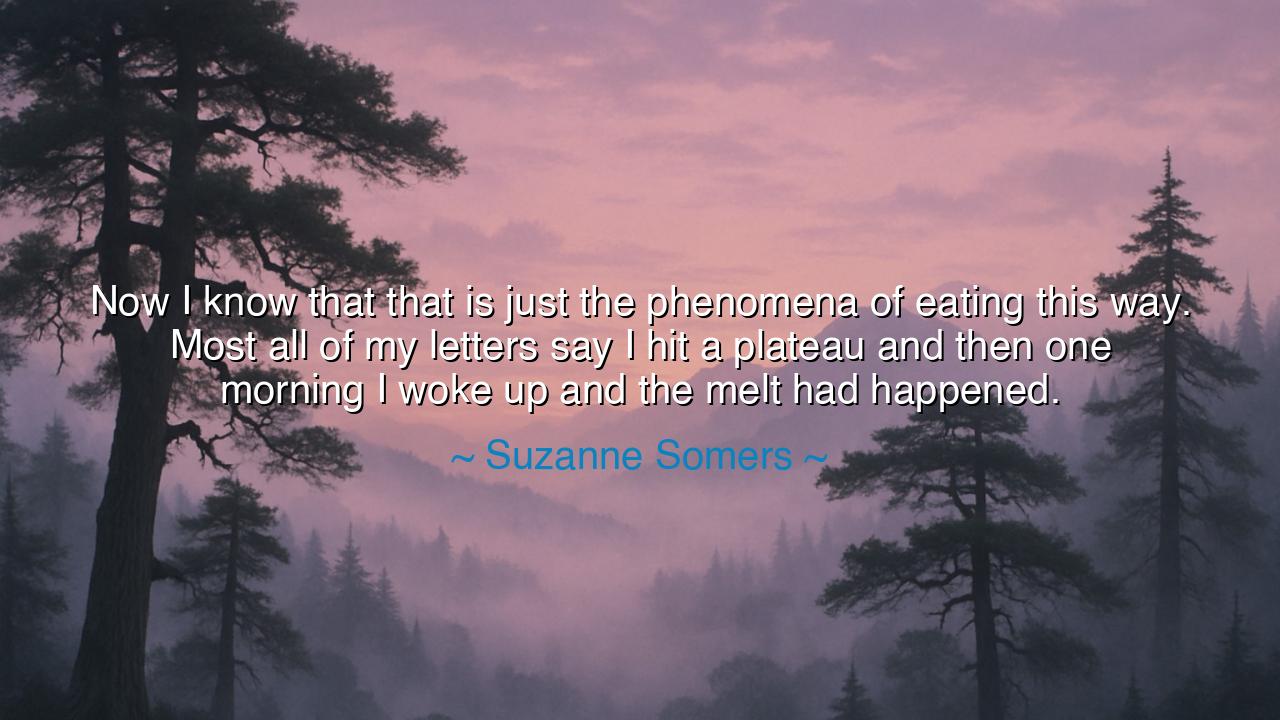
Now I know that that is just the phenomena of eating this way.
Now I know that that is just the phenomena of eating this way. Most all of my letters say I hit a plateau and then one morning I woke up and the melt had happened.






Hear the words of Suzanne Somers, who spoke not merely of diet, but of the mysterious rhythm of effort and reward: “Now I know that that is just the phenomena of eating this way. Most all of my letters say I hit a plateau and then one morning I woke up and the melt had happened.” In these words lies a parable of patience, a lesson about the unseen labors of the body and the soul. For life itself is filled with seasons of delay, where progress hides in silence, only to reveal itself suddenly, as if overnight.
The plateau is the great trial of the human spirit. It is the long plain where no movement seems to occur, where one toils yet sees no reward, where hope itself is tempted to wither. In the matter of health, as Somers describes, it is the moment when change seems to halt, when the body resists transformation. But this image reaches further: into the craftsman waiting for mastery, the student striving for knowledge, the warrior enduring training. In all pursuits, the plateau comes, and with it the temptation to despair.
Yet the melt—that sudden shift, that moment of visible change—comes not by accident, but as the fruit of unseen labor. Just as ice weakens silently before it cracks, just as seeds germinate unseen beneath the soil before bursting forth, so too does progress often occur out of sight. One morning, as Somers declares, the melt is simply there, as if gifted overnight. But it was not sudden—it was the unveiling of work long in motion, the harvest of patience sown in the dark.
The ancients knew this truth. Consider the story of the bamboo tree of the East. For years after planting, the ground shows no sign of growth. Yet beneath the soil, roots are stretching deep, foundations are strengthening. Then, suddenly, in a single season, the bamboo shoots skyward, growing tall in what seems an instant. But the phenomena was not a miracle of one season—it was the reward of years unseen. So too is the melt, whether in health, in art, or in the labors of the heart.
History too provides its example. Think of Thomas Edison, who endured countless failures before the light bulb was born. To the world, it seemed as if the moment of invention arrived in a flash. Yet behind that flash were years of struggle, thousands of experiments, the long walk upon the plateau of failure. His melt happened, as Somers describes, not in one morning, but in the accumulation of hidden effort, revealed suddenly to all eyes.
The lesson is luminous: do not abandon your path when you feel trapped upon the plateau. The absence of visible change does not mean nothing is happening. Beneath the surface, in the unseen chambers of your body, your mind, your spirit, transformation is unfolding. The day of the melt will come—if you do not give up before it arrives. Thus patience is not weakness but strength, the quiet endurance that carries you across the flat lands until the breakthrough dawns.
Therefore, O traveler, remember Somers’s wisdom. Whether you labor in health, in craft, in love, or in faith, accept that progress often hides before it shines. When you feel stuck, do not surrender. Trust the unseen work, and wait for the morning when suddenly the melt has happened. For life’s greatest changes rarely come when we demand them—they arrive in their own time, silently, and then all at once.
So live by this truth: the plateau is not the end but the preparation. The phenomena of growth is that it is slow, then sudden. Endure, continue, and believe. For one day, without warning, you too shall awaken to find the melt has happened, and all your patience will be crowned with victory.






AAdministratorAdministrator
Welcome, honored guests. Please leave a comment, we will respond soon